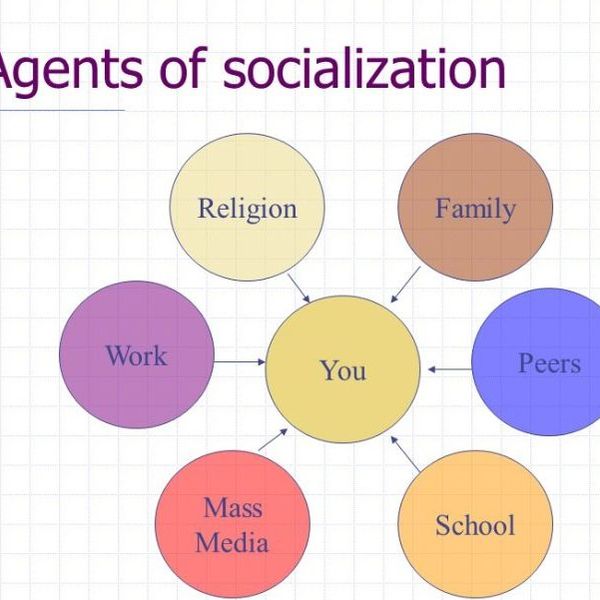Sociologists view socialization as a two-fold process. (Ferris K. & Stein J.,2018). It includes the process by which a society, culture or group teaches individuals to become functioning members and the procedure by which individuals learn and internalize the values and norms. (Ferris K. & Stein J.,2018) We are challenged with whether our need socialization is determined by nature or nurture and the ongoing debate of their respective roles of genetics and socialization in determining individuals’ behaviors and traits. (Ferris K. & Stein J.,2018) The debate of nature vs. nurture started centuries ago! The question is whether human behavior is driven by innate biological effects or is it a result of our learning and environment is still a topic of discussion by sociologists and psychologists alike. Gene Robinson looks at genes vs environment in an experiment with bees by manipulating their society or of family composition. In this experiment, the social environment and genetics composition were changed and look at the effects on the behavior of the individuals on the brain and the genes inside the brain. (Robinson, 2010) This study is used to look at the root of social behavior, the behavior of the individuals, the brain and genes and how genes influence social behavior what it tells us about Nature vs Nurture. (Robinson, 2010) Mr. Robinson uses this approach to solve the dilemma of nature vs. nature. In fact, a study of bees cannot be compared to physically studying human nature. (Robinson, 2010)
To further expand on this topic Sociobiology arose. “Sociobiology is a branch of science that uses biological and evolutionary explanations for social behavior. “ (Ferris K. & Stein J.,2018)
I understand socialization as having the ability to mingle, co-inhabit with others either in a casual, formal or work atmosphere. Most of society relies on being able to interact with someone at some point during their day. However, since COVD-19 socialization has changed dramatically and may never be the same. Society is challenged with social distancing and most of the time adapting to being alone.
Structural functionalists would state that socialization is fundamental to society, both because it trains individuals to work effectively inside it and in light of the fact it sustains culture by transmitting from generation to generation.
There are four major stages of socialization:
- Primary Socialization – early childhood socialization
- Anticipatory Socialization- This stage occurs between childhood and adulthood.
- Developmental Socialization -Happens during adulthood
- Re-Socialization – At some point when individual changes his gathering and become affiliated with a new group they need to give up their old lifestyle. Such circumstances urge a person to desert the old qualities, standards, and convictions. To adjust to another group a person needs to get familiar with the quality’s standards and convictions of the new group. The way toward learning another lifestyle is called re-socialization.
Not everyone can transform to re-socialization, especially if the individual has been in a social isolation environment. Studies have shown it is difficult to reprogram an individual who has not experiences regular norms, values or civilized society such as feral children. Feral children are children who have had little or no human contact. (Ferris K. & Stein J.,2018) There have been many cases where parents have raised their children in cages, basement with no social interaction.
Most occurrences of resocialization require modest changes, for example, adjusting to another workplace. Extraordinary types of procedures can incorporate joining the military, going to jail, or in any case isolating from standard society.
Socialization is a journey through life beginning at birth and as we become adults, we discover what is known as ‘Self’. The self is our experience of a distinct, real, personal identity that is separate and different from all other people. (Ferris K. & Stein J.,2018)
George Herbert Mead accepted that individuals create mental self-views through communications with others. … He sketched out four thoughts regarding how oneself creates: oneself grows exclusively through social experience. Mead dismissed Freud’s thought that character is resolved incompletely by organic drives.
Sigmund Freud concocted a hypothesis of character advancement that expresses that organic senses and cultural impacts shape the manner in which an individual becomes a grown-up. Freud expressed that the psyche is made out of three segments: the id, the superego and the sense of self.
In Charles Horton Cooley’s concept of the “looking glass”. He believed that we all act as mirrors to each other. (Ferris K. & Stein J.,2018)
References
- Robinson, G. (2010, June 3). TEDxUIUC – Gene Robinson – Solving the ‘Nature vs Nurture … Retrieved April 16, 2020, from https://www.youtube.com/watch?v=kONM9WO5LGo
- Kerry Ferris/Jill Stein (2018) The Real World: An Introduction to Sociology. W.W. Norton

